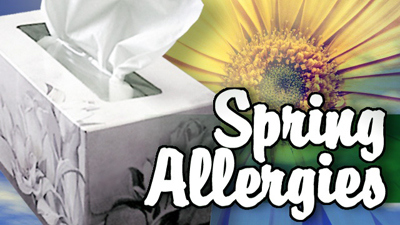
Most people get really excited at the thought of spring – warmer weather, outdoor sports, picnics, walks in the park. The list goes on!
But if you have spring allergy problems, spring time mostly brings with it the fear of sniffling, sneezing, itchy eyes and a stuffed up head.
It’s known to most as hay fever, though doctors call it seasonal allergic rhinitis.
And what’s to blame? Pollen.
Pollen season, for trees, starts in the early spring, usually right after Valentine’s Day. Late spring brings pollen in grasses, and late summer means weed pollens.
How do you control spring allergies?
Even if your allergies are severe, you can still make it through spring by doing the following things:
- Get educated about your allergens and what’s causing them. See an allergist.
- Lower your exposure to allergens.
- Try over-the-counter medications.
- Look into allergy shots or immunotherapy.
What’s causing your allergy problems?
The level of your misery is dependent on how large the pollen grains are in your area.
The smaller and lighter the pollen, the more trouble it’s likely to cause for allergy sufferers.
When it’s windy, those lighter, smaller pollens are carried miles and miles. They can travel more than 100 miles from the tree or grass on which they grew.
Different trees and grasses produce different types of pollen, so your allergies are based on where you live.
How do you avoid pollen?
Your life would be easier if you never had to step outside, but we all know that’s just not possible.
But you can strive to stay inside between 10 a.m. and 4 p.m. That’s when pollens are at their highest number.
Here are some other tips for reducing your exposure:
- Use a HEPA (high-efficiency particulate air) filter on your air conditioner and heater.
- Wipe your pet’s fur before he or she comes back inside. Pollen can travel inside on pet fur.
- Keep your shoes outside at your doorstep so you don’t bring in pollen on your shoes.
- Don’t hang your clothes outside to dry. Always use a dryer.
How do you treat allergies?
If you’ve done everything you can to avoid pollen and other allergens, but still feel that hay fever coming on, you can try the following to help with your symptoms:
- Over-the-counter antihistamine
- Over-the-counter eye drops
- Over-the-counter decongestants
- Over-the-counter or prescription nasal spray
- Allergy shots from your doctor
- Steroid nasal sprays
- Dehumidifier for your home
It’s important to note that over-the-counter decongestants can raise your blood pressure, so you should always consult with your doctor before you decide on a course of treatment for your allergies.
If you are suffering from allergy symptoms and you can’t keep the pollen at bay, contact your local physician or stop by an Urgent Care Clinic today.
